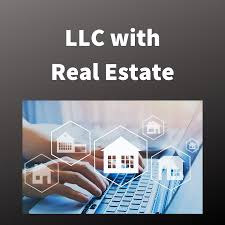LLC Real Estate Taxes

LLC Real Estate Taxes. A Limited Liability Company (LLC) for real estate is an established legal entity that allows investors to purchase and own real estate in such a way that protects them from personal liability. This means that the investor buys and sells real estate, as well as conducts other business, in the name of the LLC, rather than as an individual.
The formation of a real estate LLC enables businesses to avoid being taxed directly, with investors reporting the company’s profits or losses on their personal tax returns. In most cases, this will result in a lower rate for business owners, as well as the avoidance of double taxation.
One of the most significant benefits of an LLC is that of pass-through taxes. LLC owners don’t have to file a corporate tax return. An owner simply reports their share of profit and loss on their individual tax return. There are some circumstances where this is preferable. Also, this prevents double taxation, your business paying taxes and you paying taxes.
The IRS treats one-member LLCs as sole proprietorships for tax purposes. This means that the LLC itself does not pay taxes and does not have to file a return with the IRS. As the sole owner of your LLC, you must report all profits (or losses) of the LLC on Schedule C and submit it with your 1040 tax return.
What Kind of Tax Return Do I File? If the only member of the LLC is an individual, the LLC income and expenses are reported on Form 1040, Schedule C, E, or F. If the only member of the LLC is a corporation, the LLC income and expenses are reported on the corporation’s return, usually Form 1120 or Form 1120S.
Investing in real estate offers many lucrative advantages compared to other investment vehicles. On the other hand, it can also expose real estate investors to risks and pitfalls they never knew existed. That said, forming a real estate LLC is one of the more important things investors can do to safeguard themselves from outside interference.
A real estate LLC is a corporate structure that aims to not only shield you from being sued if things go awry, but protect your personal assets such as a home, personal bank account or investments. By forming a real estate LLC, investors and their respected businesses will be viewed as two separate entities in the eyes of the corporate world, helping to protect them from being personally liable in case of debt or lawsuit from the business. Along with protection, a real estate LLC offers unique tax advantages to investors, as well as flexibility to accommodate their growing business demands.
What Is A Real Estate LLC?
An LLC for real estate is an established legal entity that allows investors to purchase and own real estate in such a way that protects them from personal liability. This means that the investor buys and sells real estate, as well as conducts other business, in the name of the LLC, rather than as an individual. In case any outside entities or individuals make a claim, the individuals behind the entity are able to avoid personal liability. In addition, property owners are allowed to establish individual LLCs for each separate property, meaning that they can avoid cross-liability between properties.
Forming a real estate LLC is important for protection so get it established before you seek out the real estate that will be purchased under the LLC entity.
- State the process of forming your LLC before pursuing new deals.
- Selecting the correct LLC structure for your business. (member / manager)
- Don’t co-mingle personal and business funds.
- Consult an expert (ideally our law firm) for advice on the entity and tax structure.
- Make sure to take the proper steps and due diligence needed when forming the LLC.
CLICK HERE for information on forming a business.
CLICK HERE for information regarding books published by Attorney Ronald Cook.
LLC Real Estate Taxes


